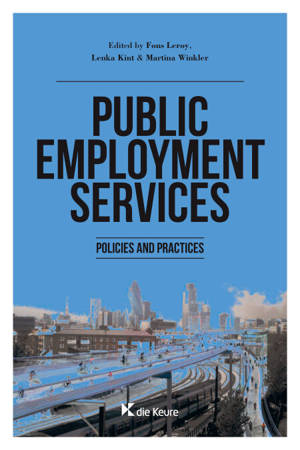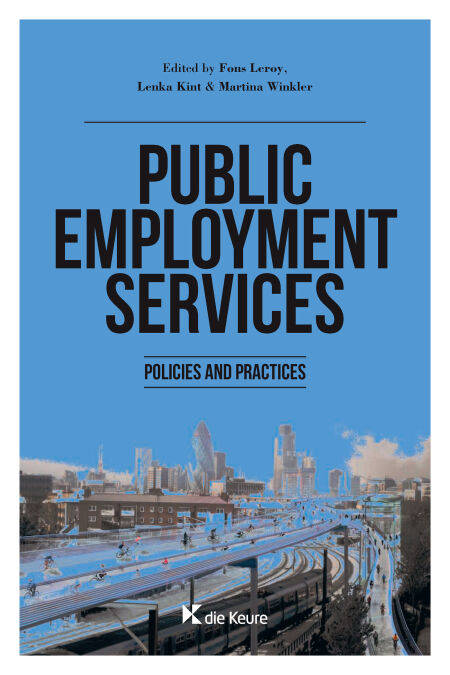
En raison d'une grêve chez bpost, votre commande pourrait être retardée. Vous avez besoin d’un livre rapidement ? Nos magasins vous accueillent à bras ouverts !
- Retrait gratuit dans votre magasin Club
- 7.000.000 titres dans notre catalogue
- Payer en toute sécurité
- Toujours un magasin près de chez vous
En raison de la grêve chez bpost, votre commande pourrait être retardée. Vous avez besoin d’un livre rapidement ? Nos magasins vous accueillent à bras ouverts !
- Retrait gratuit dans votre magasin Club
- 7.000.0000 titres dans notre catalogue
- Payer en toute sécurité
- Toujours un magasin près de chez vous
Public Employment Services EBOOK
Policies and Practices
Fons Leroy, Lenka Kint, Martina Winkler
Ebook | Anglais
22,99 €
+ 22 points
Description
An insight into PES policies and practices.
Public Employment Services are confronted with the ever-changing world of work from various angles: as organisation, as employer and as key actor on the labour market. Decisive mega trends such as globalisation, demographic shifts or migration, driven by tremendous technological developments and characterised by a considerable extent of complexity and volatility, have a huge impact on our labour markets and finally on PES.
Guiding citizens through this (r)evolution and supporting them to manage necessary or desired transitions is a shared challenge of European PES and a huge public responsibility PES are actively taking up. Thereby PES are contributing to well-balanced labour markets which are essential for sustainable growth and for maintaining our social welfare supporting systems.
PES jointly develop solutions through exchanging and learning from each other, rethinking practices and policies and continuously improving their organisations for more sustainable and inclusive labour markets and in order to better serve employers and jobseekers. This book gives an insight into PES policies and practices which are inspired by the close collaboration in the PES Network. PES Network members reflect on their European-wide learning organisation, they point out challenges and their strategic and operational answers from a national perspective, bringing in valuable personal experience. “PES Policies and Practices” thus touches upon a broad variety of PES core topics and gives you the chance to understand their business in a politically shaped environment, characterised by a unique collaboration.
The collection of voices from the PES Network world in this book demonstrates the Network´s potential to anticipate and respond to changes in the world of work.
EXTRACT
What is Benchlearning about?
How do other Public Employment Services (PES) solve problems? What is the secret of
their success? Can I learn from the others and transfer successful practices?
PES try to find answers on these questions through “Benchlearning”.
Comparing performance, benchmarking, was the main subject of the initial discussions
in the Network of Heads of PES going back to the 1998s. Over time, the focus moved to
mutual
learning and the exchange of good practices across Europe.
Benchlearning combines these two main elements. It is about interlinking benchmarking
and mutual learning. In more detail: The PES Network Decision defines Benchlearning as
“process of creating a systematic and integrated link between benchmarking and mutual
learning activities that consists of identifying good performances through indicator-based
benchmarking systems […] and of using findings for tangible and evidence-informed
mutual
learning activities, including good or best practice models”.
ABOUT AUTHORS
Fons Leroy was the chief executive officer of VDAB, the Flemish Public Employment Service, and current Chair of the European Network of Public Employment Services.
Lenka Kint was from 2011 to 2017 Executive Sercetary at WAPES, the World Association of Public Employment Services, and is currently Strategic accountmanager International Relations at VDAB.
Martina Winkler is a Seconded National Expert from the German Federal Employment Agency to the EU Commission, working in the PES Network Secretariat on the Benchlearning initiative.
Public Employment Services are confronted with the ever-changing world of work from various angles: as organisation, as employer and as key actor on the labour market. Decisive mega trends such as globalisation, demographic shifts or migration, driven by tremendous technological developments and characterised by a considerable extent of complexity and volatility, have a huge impact on our labour markets and finally on PES.
Guiding citizens through this (r)evolution and supporting them to manage necessary or desired transitions is a shared challenge of European PES and a huge public responsibility PES are actively taking up. Thereby PES are contributing to well-balanced labour markets which are essential for sustainable growth and for maintaining our social welfare supporting systems.
PES jointly develop solutions through exchanging and learning from each other, rethinking practices and policies and continuously improving their organisations for more sustainable and inclusive labour markets and in order to better serve employers and jobseekers. This book gives an insight into PES policies and practices which are inspired by the close collaboration in the PES Network. PES Network members reflect on their European-wide learning organisation, they point out challenges and their strategic and operational answers from a national perspective, bringing in valuable personal experience. “PES Policies and Practices” thus touches upon a broad variety of PES core topics and gives you the chance to understand their business in a politically shaped environment, characterised by a unique collaboration.
The collection of voices from the PES Network world in this book demonstrates the Network´s potential to anticipate and respond to changes in the world of work.
EXTRACT
What is Benchlearning about?
How do other Public Employment Services (PES) solve problems? What is the secret of
their success? Can I learn from the others and transfer successful practices?
PES try to find answers on these questions through “Benchlearning”.
Comparing performance, benchmarking, was the main subject of the initial discussions
in the Network of Heads of PES going back to the 1998s. Over time, the focus moved to
mutual
learning and the exchange of good practices across Europe.
Benchlearning combines these two main elements. It is about interlinking benchmarking
and mutual learning. In more detail: The PES Network Decision defines Benchlearning as
“process of creating a systematic and integrated link between benchmarking and mutual
learning activities that consists of identifying good performances through indicator-based
benchmarking systems […] and of using findings for tangible and evidence-informed
mutual
learning activities, including good or best practice models”.
ABOUT AUTHORS
Fons Leroy was the chief executive officer of VDAB, the Flemish Public Employment Service, and current Chair of the European Network of Public Employment Services.
Lenka Kint was from 2011 to 2017 Executive Sercetary at WAPES, the World Association of Public Employment Services, and is currently Strategic accountmanager International Relations at VDAB.
Martina Winkler is a Seconded National Expert from the German Federal Employment Agency to the EU Commission, working in the PES Network Secretariat on the Benchlearning initiative.
Spécifications
Parties prenantes
- Auteur(s) :
- Editeur:
Contenu
- Langue:
- Anglais
Caractéristiques
- EAN:
- 9782874035722
- Date de parution :
- 18-09-19
- Format:
- Ebook
- Protection digitale:
- /
- Format numérique:
- ePub

Les avis
Nous publions uniquement les avis qui respectent les conditions requises. Consultez nos conditions pour les avis.






